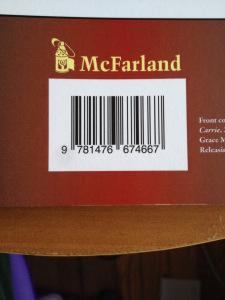I risk being seen as even more of a book nerd by addressing the topic of International Standard Book Numbers, or ISBNs.For those who’ve purchased a book in the past several decades, you’ve seen ISBNs, but perhaps unwittingly.They’re represented by a barcode, often on the back cover in the lower left corner, or sometimes the middle.The ISBN is the edition’s unique identifier, but it isn’t necessarily a guarantee that the contents will be exactly the same since typos corrected for new printings may use the same ISBN already purchased.Yes, you read right.Publishers have to purchase ISBNs.Without them listings on many websites and distributors’ lists would be impossible.The ISBN is what fulfillers use to order books since neither author nor title is necessarily unique.Many book titles have been used to the point of dullness.

A typical ISBN
A colleague recently complained to me about being able to request permission to reuse something from a book without an ISBN.Rights vendors often require them.The ISBN came into usage, however, only in 1970.As I’ve learned from trying to load older books into my Goodreads list, there are all kinds of complications and potential confusions if you don’t have the unique identifier for your source.Titles cannot be copyrighted, and many are consequently overused.The ISBN is your guide to a specific book.If the book came before the ISBN system it’s going to take some extra work to ensure that you find the correct way to identify what you’re talking about.This is only one of the many ways in which the book industry differs from most others.It’s also the reason that I generally object to corrected printings.
Perhaps it’s odd to see a publishing professional take a hard line on book content.The fact is almost always an author is given the opportunity to proofread, well proofs.The copyedited, typeset book is given to them.Yes, errors may creep in after this stage, but that’s not very common.If an author didn’t catch mistakes, then a corrected edition ought to be published with a new ISBN. But that’s not how it works. Each ISBN should indicate the exact same content.Although an ISBN must be purchased, just one isn’t expensive (witness all the self-publishing going on these days and that should be obvious).Publishers that have to buy many thousands of them, however, are disinclined to waste them.I’m not a fan of all technology, but the ISBN seems like a good concept to me.Even if it’s not a guarantee that things are what they seem.
